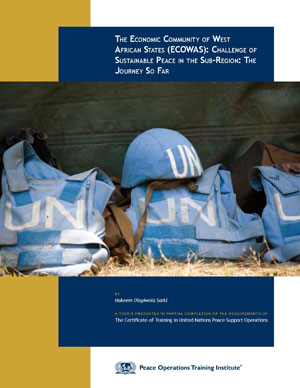The Economic Community of West African States (ECOWAS): Challenge of Sustainable Peace in the Sub-Region: The Journey So Far
Thèses COTIPSO: Approuvé
Étudiant: Sarki, Hakeem Olayiwola
Date de réussite: Sep 2008
Un extrait de la thèse:
The termination of the Cold War between the erstwhile super power, former Union of Soviet Socialist Republic (USSR) and the United States of America (USA) with their allies, ushered in relative peace and global stability; the world was spared from the specter of a full-scale nuclear war. The ensuring calm has enabled increased economic and technological advancement in most nations of the world. As these other regions were basking in the dividend of newly found post-cold war peace; paradoxically, this encouraged series of armed conflicts within the Third World especially in the West African Sub region. The main causes of these conflicts could be attributed to poor governance, ethnicity, boundary dispute, military incursion in governance and economic deprivations. West Africa had to deal with different kinds of challenges, some of which took violent forms and in some cases posed a serious threat to the very existence of the states concerned. The failure by some of these countries to reach a peaceful resolution to their domestic pressures often led to violent outbursts with serious security implications for the Sub region. The chaotic and brutal nature of the conflicts coupled with the inaction of the big powers reinforced the need for an African solution to what was largely perceived an African problem. The first of these moves came on 25 August 1990 when the Economic Community of West African States (ECOWAS) decided that an intervention force (the ECOWAS cease-fire monitoring and observer group- ECOMOG), be inserted into Liberia in a bid to put a stop to the mayhem and mass murder that gripped that unfortunate country.
